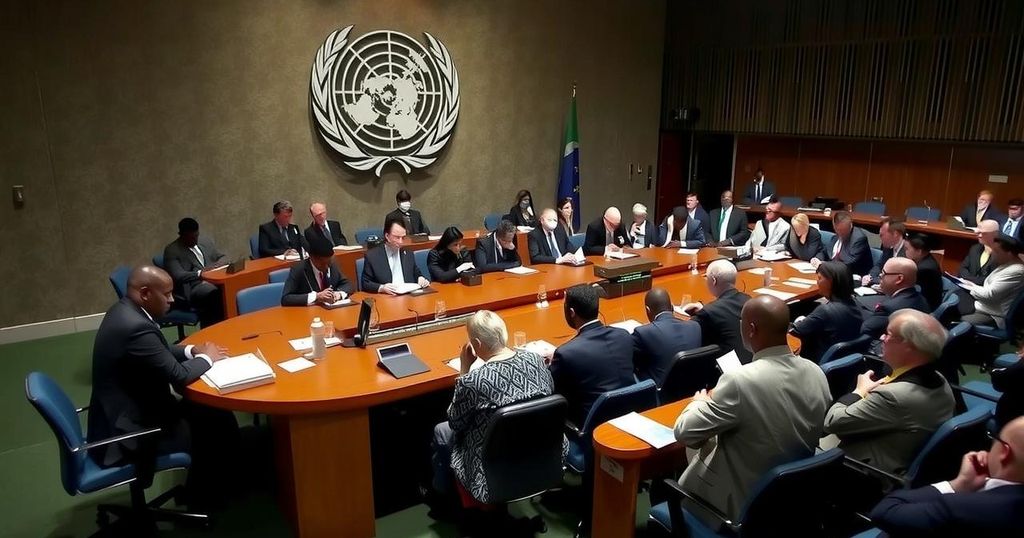Russia Vetoes UN Ceasefire Resolution Amid Sudanese Humanitarian Crisis

Russia vetoed a UK-backed UN resolution aimed at establishing a ceasefire in Sudan, prompting outrage from the UK and US. The Sudanese civil war has caused tens of thousands of deaths and massive displacement. The veto was justified by Russia as a means to protect Sudanese sovereignty, while Sudan’s representative criticized the resolution for not addressing critical issues related to the conflict.
In a recent United Nations Security Council meeting, Russia exercised its veto power on a resolution aimed at establishing a ceasefire in Sudan, a move that drew severe criticism from both the United Kingdom and the United States. British Foreign Secretary David Lammy condemned the veto as “a disgrace,” emphasizing the dire humanitarian crisis resulting from the ongoing civil war. The conflict, which has persisted for 19 months, is characterized by fierce clashes between the Sudanese army and the Rapid Support Forces (RSF), leading to tens of thousands of deaths and displacing over 11 million people.
The UK-backed resolution, co-sponsored by Sierra Leone, sought an immediate cessation of hostilities and prompted discussions for a national ceasefire. Moreover, it urged both factions to respect existing agreements aimed at civilian protection, specifically addressing RSF attacks in regions like Darfur. Nevertheless, the resolution was hindered by Russia’s veto, despite support from all other Security Council members.
Lammy expressed distress over Russia’s refusal to act decisively and questioned the morality of their stance given the humanitarian toll. U.S. Ambassador Linda Thomas-Greenfield described Russia’s actions as obstructive and self-serving, aimed at advancing its political objectives amidst a humanitarian disaster. In rebuttal, Russia’s representative, Dmitry Polyanskiy, defended the veto, asserting that it protected Sudanese sovereignty and accused the UK of trying to exploit the crisis for its agenda.
Sudan’s envoy to the UN, Al-Harith Idriss al-Harith Mohamed, also criticized the resolution’s omissions, including a lack of condemnation directed towards the United Arab Emirates’ support of the RSF and the classification of the RSF as terrorist entities due to alleged war crimes. The ongoing conflict in Sudan raises urgent concerns regarding human rights violations and the need for international intervention.
The civil war in Sudan began in April 2021, stemming from a power struggle between the Sudanese army and the Rapid Support Forces. This protracted conflict has resulted in profound humanitarian crises, marked by widespread displacement, famine risks, and severe violations of human rights. The United Nations has faced criticism for its slow response to the escalating situation, which has prompted various nations to propose resolutions for peace and stability in the region. The UK and the US have taken a firm stance on the need for immediate action, while Russia has positioned itself against Western involvement, citing the importance of non-interference in Sudan’s internal matters.
The recent veto by Russia against the UN Security Council resolution calling for a ceasefire in Sudan underscores the complexities of international politics surrounding humanitarian crises. The response from the UK and US highlights a growing frustration over the lack of effective action in the face of significant casualties and human suffering in Sudan. The situation remains critical, and the continued rifts between powerful nations complicate the prospects for peace and resolution in the region. The need for collaborative international efforts to address the horrors of the Sudanese conflict has never been more urgent.
Original Source: www.bbc.co.uk






